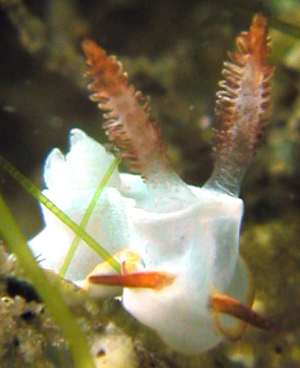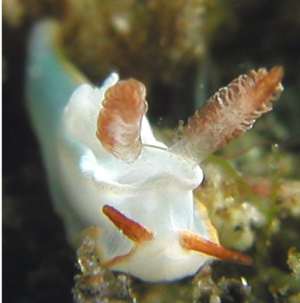
Goniodoris sp. 1
Order: NUDIBRANCHIA
Suborder: DORIDINA
Superfamily: ANADORIDOIDEA
Family: Goniodorididae
DISTRIBUTION
Japan, ?South Africa
PHOTO
Futou, Suruga bay, west coast of Izu peninsula, Japan, 10 Oct, 2003. Depth: 3m. Size: approx.7mm. Photo: Yukari Sato
Authorship detailsRudman, W.B., 2003 (November 15) Goniodoris sp. 1 [In] Sea Slug Forum. Australian Museum, Sydney. Available from http://www.seaslugforum.net/find/gonisp1
Related messages
Re: Goniodoris from eastern Australia
May 7, 2009
From: Sean Kearney

Greetings Bill,
Finally getting around to sorting out some old pictures from Lembeh. I found what appears to be Goniodoris sp. 1among my photographs. Not a very good pic, but enough to make me think that it is the same critter as in message #21073. Can't really be sure of dive site or depth. I can give a close guess.
Locality: Lembeh Strait, 15 meters, Indonesia, Celebes Sea, 15 Sep 2007, sandy slope. Length: 7 mm. Photographer: S. Kearney.
Thanks for your great work. I will forward a couple more in the days to come.
Sean
skearney@dc.rr.com
Kearney, S., 2009 (May 7) Re: Goniodoris from eastern Australia. [Message in] Sea Slug Forum. Australian Museum, Sydney. Available from http://www.seaslugforum.net/find/22427
Dear Sean,
Yes this certainly seems to be what I am calling Goniodoris sp. 1.
Best wishes,
Bill Rudman
Goniodoris from eastern Australia
March 25, 2008
From: Leanne & David Atkinson

Dear Bill,
We found this tiny nudibranch we haven't seen before. It seems to be a Goniodoris in shape but the nearest we can find on the forum to it is Goniodoris sp.1. In your information you mention Goniodoris violacea but there isn't a fact sheet. We don't have anything in our reference books on Goniodoris violacea but could find something similar in Neville Coleman's 1001 Nudibranchs listed as Goniodoris cf. violacea that was photographed at Port Stephens. The colouration of ours appears to be black and white but we wondered whether given that people tend to see colours slightly differently this might be Goniodoris violacea. What do you think? It was obviously not on a food source since it was moving fast and rearing up as if to sniff the current looking for food or a mate.We thought these series of photos had captured its major external features well. Hope it is of interest thanks as always for your work.
Locality: The Pipeline, Nelson Bay, Port Stephens, 5 metres, New South Wales, Australia, Pacific, 11 October 2007, Silty sandy bottom with scattered algae, seaweed, kelp, ascidians, bryozoans, sponges, soft corals and gorgonians. Length: Approximately 5 mm. Photographer: Leanne & David Atkinson.
Regards,
Leanne & David Atkinson
atk@hunterlink.net.au



Dear Leanne & David,
I am pretty sure your animal is the same as the one I am calling Goniodoris sp. 1 . In the close-up of the head end I have included above I can see yellow spots inside the brown border to the foot which match the yellow submarginal band found in the photos from Japan.
As I discuss in a previous message [#11291] I don't think this fits the original description of Goniodoris violacea at all. That species was described as having a purple border to the mantle. I guess it is possible they are variants of one species, but I can find nothing in colour to really link them other than the white background colour. I have added a Fact Sheet for G. violacea. AS fra as I know it has not been reported since Risbec's publications.
Best wishes,
Bill Rudman
Goniodoris sp. 1 from Kapalai
November 21, 2003
From: Mabel Fang

Dear Bill
Concerning Yukari Sato's message about Goniodoris from Izu, Japan, I found the same species during a day dive at Kapalai, East Malaysia. I wonder if this is the species known as Goniodoris violacea or a colour form of it? The rhinophores appear to be disproportionately large compared to the size of its body. Is this a distinguishing feature of the family?
Even though it was less than 1 cm in length, it was crawling at speed across
a sandy rock patch.
Date: 10 August 2003
Depth: 45 feet
Kind regards
Mabel Fang
barramundi@ooi-online.com
Fang, M., 2003 (Nov 21) Goniodoris sp. 1 from Kapalai. [Message in] Sea Slug Forum. Australian Museum, Sydney. Available from http://www.seaslugforum.net/find/11291Dear Mabel,
I am not sure where you got the identification Goniodoris violacea as don't know of any reference apart from Risbec's [Risbec, 1928, 1953]. That species is described as light purple with whitish patches, a purplish border to the mantle and purplish rhinophores. The edge of the foot is also has 'wine coloured' spots. There is also a purplish median ridge down the foot from the mantle to the posterior tip. This is quite different from the white mantle border in your animal and the reddish-yellow border to the foot, and reddish-yellow on the oral tentacles and rhinophores. As far as I know Goniodoris violacea has not been refound since its description from New Caledonia. I suspect the animal named Goniodoris cf. violacea in Marshall & Willan (1999) is the same as your species.
• Marshall, J.G. & Willan, R.C., 1999. Nudibranchs of Heron Island, Great Barrier Reef.
• Risbec, J. (1928) Contribution a l'étude des nudibranches Néo-Calédoniens. Faune des Colonies Francaises 2(1): 328, pls.1-12.
• Risbec, J. (1953) Mollusques nudibranches de la Nouvelle-Calédonie. Faune Union Française Paris, Libraire Larose, 15: 1-189.
Best wishes
Bill Rudman
Goniodoris? from Izu,Japan
November 17, 2003
From: Yukari Sato

Hello Dr.Rudman,
I have found this animal at Izu, Japan.
Could you identify this?
Data:
Date: 10 Oct, 2003
Depth: 3m
Size: approx.7mm.
Loc: Futou, Suruga bay, west coast of Izu peninsula, Japan
Best regards,
Yukari Sato
yuks@cg7.so-net.ne.jp



Dear Yukari,
This is a species of Goniodoris and it is possible it is the species illustrated from the Indian Ocean coast of South Africa by Terry Gosliner (1987: photo 162) as Goniodoris. Certainly the external colour looks the same. As far as I know it doesn't have a name at present
• Gosliner, T., 1987. Nudibranchs of Southern Africa.
Best wishes
Bill Rudman
